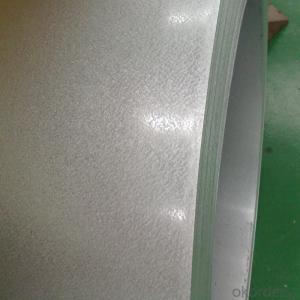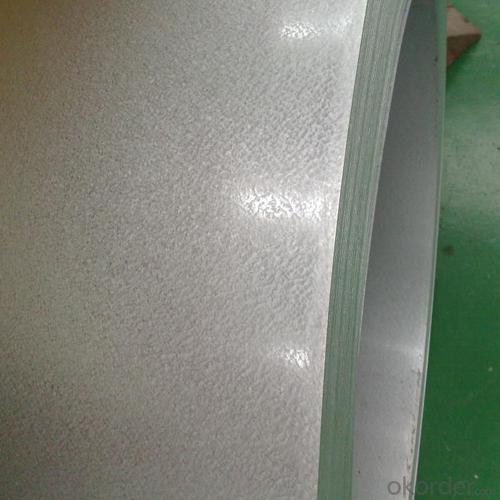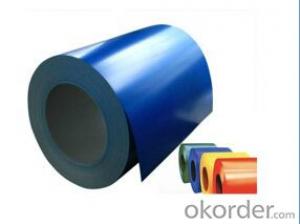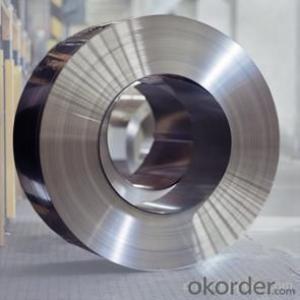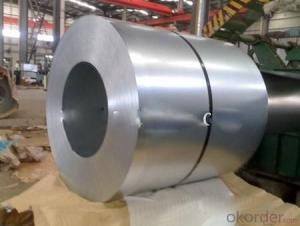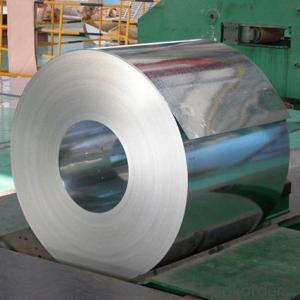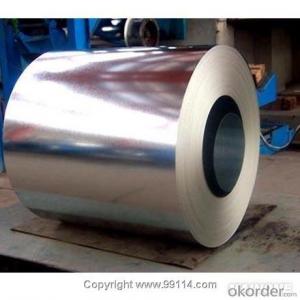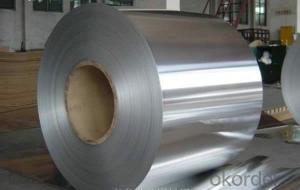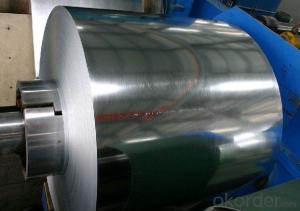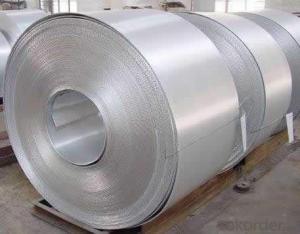Al-Zinc Coated Steel rolled coil for Roofing
- Loading Port:
- Tianjin
- Payment Terms:
- TT OR LC
- Min Order Qty:
- 50 m.t.
- Supply Capability:
- 30000 m.t./month
OKorder Service Pledge
OKorder Financial Service
You Might Also Like
Structure of Al-Zinc coated steel coil
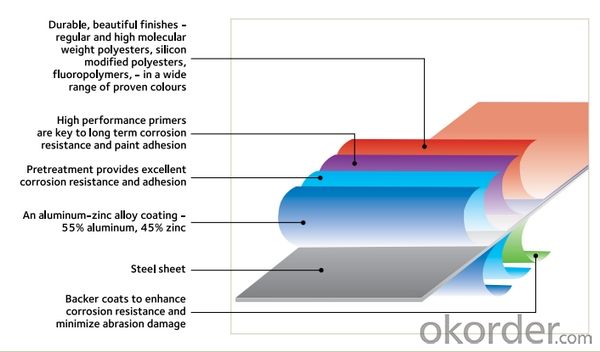
Description of Aluminum Zinc Rolled Coil
The detailed information for the Al-Zinc coated steel coil is as following and it is mainly using for roofing producing, making ceiling grid and all kinds of roll forming structure.
Thickness: 0.20mm to 1.20mm
Width: 914mm, 1000mm, 1200mm, 1219mm and 1250mm, or slit narrow strip according to customer request, can be slit from 20mm to 610mm.
Coil ID: 508mm
Coil weight: 3 tons to 6 tons
Thickness tolerance: +/- 0.02mm or according to customer request.
Main Feature of Al-Zinc coated steel coil
1.Corrosion resistance: It mainly depends on the aluminum protection. When the zinc being worn, the aluminum will form a dense layer of aluminum oxide, resist corrosion material to prevent further corrosion inside.
2. Heat resistance: Aluminum zinc alloy steel sheet has excellent heat resistance, can withstand high temperatures over 300 centigrade, and is similar with aluminized steel high temperature oxidation resistance. It often used in chimney pipes, ovens, fluorescent lighting device and the device cover.
3. Heat reflective: Galvanized steel plate heat-reflective high rate is twice as galvanized steel, often used to make insulation materials.
4. Economy: Because density of 55% AL-Zn is smaller than the density of Zn, so in the same weight and thickness of Galvanized zinc layer, aluminum-zinc steel plate is larger area more than 3% of galvanized steel sheet.
Applications of Al-Zinc coated steel coil
1. Construction and building: roofing; ventilating duct; handrail; partition panel;etc.
2. Electric appliance: refrigerator; washing machine; refrigerator; DVD;etc.
3.Transportation: oil tank; road sign; etc.
4.Agriculture:barn; etc.
5.Others:vending machine; game machine; etc.
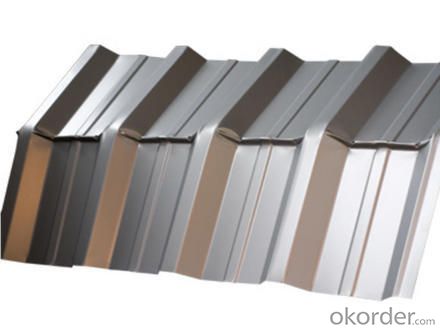
Specifications of Al-Zinc coated steel coil
Prepainted galvanized steel coil ( PPGI ) | Prepainted galvalume steel coil ( PPGL ) | |
Standard | JIS G3312 CGCC | J IS G3322 CGLCC |
Valid thickness | 0. 16 ~1. 2 0mm | 0. 16 ~1. 2 0mm |
Coil width | 600~1250mm | 600~1250mm |
Coil ID | 508mm & 610mm | 508mm & 610mm |
Coil weight | 3~5 tons | 3~5 tons |
Coating | 4 0~275 g/m2 | AZ30 to AZ150 |
Paint t hickness , top side | 15~25 microns | 15~25 microns |
P aint t hickness , reverse | 5~7 microns or 15~25 microns | 5~7 microns or 15~25 microns |
Color | any RAL code | any RAL code |
Package | vertical, eye to sky & horizontal | vertical, eye to sky & horizontal |
MOQ | 25 tons | 25 tons |
FAQ of Al-Zinc coated steel coil
We have organized several common questions for our clients,may help you sincerely:
1. What is the minimum order quantity ?
Our MOQ is 50mt for each size. And we will consider to give more discount if you make big order like 1000 tons and more. Further more, the more appropriate payment term your offer the better price we can provide.
2. How long can we receive the product after purchase?
Usually within thirty working days after receiving buyer’s advance payment or LC. We will arrange the factory manufacturing as soon as possible. The cargo readiness usually takes 15-25 days, but the shipment will depend on the vessel situation.
3. How to guarantee the quality of the products?
We have established the international advanced quality management system,every link from raw material to final product we have strict quality test;We resolutely put an end to unqualified products flowing into the market. At the same time, we will provide necessary follow-up service assurance.
- Q: How are steel coils used in the production of agricultural systems?
- Steel coils are often used in the production of agricultural systems due to their durability and strength. These coils are typically used in the construction of machinery and equipment that are essential in agricultural operations. One common application of steel coils is in the manufacturing of farming machinery such as tractors, plows, and cultivators. These machines require sturdy components to withstand the demanding conditions of the agricultural environment. Steel coils are used to fabricate the frames, chassis, and other structural parts of these machines, providing the necessary strength and support. Steel coils are also used in the production of irrigation systems, which are crucial for efficient water management in agriculture. These coils are utilized in the construction of pipes, valves, and fittings, ensuring the durability and longevity of the irrigation system. Additionally, steel coils are used to manufacture storage tanks and silos, which are essential for storing and preserving agricultural products such as grains, seeds, and fertilizers. Furthermore, steel coils find application in the construction of greenhouses and agricultural buildings. The coils are used to fabricate the structural framework, providing stability and resistance against environmental factors. Steel coils are also used in the production of fencing and enclosures to protect crops and livestock from external threats. In summary, steel coils play a vital role in the production of agricultural systems by providing the necessary strength, durability, and stability required for farming machinery, irrigation systems, storage facilities, and agricultural structures. Their usage ensures that these systems can withstand the demanding conditions of the agricultural industry and contribute to efficient and sustainable farming practices.
- Q: What are the common applications of hot-dip galvanized steel coils?
- Hot-dip galvanized steel coils are widely utilized across various industries due to their exceptional resistance to corrosion and long-lasting durability. These coils find numerous applications in different sectors, including construction, automotive, appliances, agriculture, electrical and telecommunication, transportation, and industrial sectors. The following are some of the common uses of hot-dip galvanized steel coils: 1. Construction: The construction industry extensively relies on hot-dip galvanized steel coils for applications like roofing, siding, gutters, and downspouts. The coils' corrosion resistance ensures that structures can withstand harsh weather conditions, resulting in low-maintenance and long-lasting buildings. 2. Automotive: In the automotive sector, hot-dip galvanized steel coils are widely employed for manufacturing body panels, frames, chassis, and structural components. These coils provide enhanced protection against rust and offer high strength, ensuring the longevity of automotive parts. 3. Appliances: Hot-dip galvanized steel coils are utilized in the production of various household appliances such as refrigerators, air conditioners, ovens, and washing machines. The coils' corrosion resistance and aesthetic appeal make them an ideal choice for these appliances. 4. Agriculture: The agricultural sector commonly uses hot-dip galvanized steel coils for constructing greenhouses, livestock shelters, fences, and irrigation systems. The galvanized coating protects the steel from corrosion caused by exposure to moisture and chemicals commonly found in agricultural settings. 5. Electrical and Telecommunication: The electrical and telecommunication industries employ hot-dip galvanized steel coils for manufacturing transmission towers, poles, cable trays, and electrical conduits. These coils' corrosion resistance and high strength ensure the safety and reliability of these infrastructure components. 6. Transportation: Hot-dip galvanized steel coils play a significant role in the transportation industry, particularly in manufacturing trailers, shipping containers, and chassis components. The galvanized coating provides protection against corrosion caused by road salt, moisture, and various environmental factors. 7. Industrial Applications: Hot-dip galvanized steel coils are widely used in various industrial applications, including storage tanks, pipelines, ductwork, and industrial equipment. The coils' corrosion resistance and durability ensure the integrity and longevity of these structures and equipment. In conclusion, hot-dip galvanized steel coils have a wide range of applications in industries such as construction, automotive, appliances, agriculture, electrical and telecommunication, transportation, and industrial sectors. The coils' corrosion resistance, durability, and aesthetic appeal make them a versatile and extensively used material in these applications.
- Q: is stainless steel a good steel for sensitive skin? or does it have to be surgical or sterling silver?
- I have sensitvie skin also. I use nickel free and titanium jewlrey, they're the safest. I never used surgical steel before though.
- Q: How are steel coils used in the production of metal panels?
- Steel coils are used in the production of metal panels as the primary raw material. These coils are fed into a roll forming machine, where they are uncoiled, flattened, and then shaped into the desired panel profiles. This process allows for efficient and continuous production of metal panels with consistent quality and strength.
- Q: How are steel coils used in the manufacturing of power transmission towers?
- Steel coils are used in the manufacturing of power transmission towers by being cut, shaped, and welded together to form the structural components of the towers. The coils provide a strong and durable material that can withstand the weight and stress of the tower, ensuring its stability and longevity.
- Q: How are steel coils cleaned?
- Steel coils are typically cleaned using a combination of chemical and mechanical processes. The coils are first treated with a degreasing agent to remove any oil or grease present on the surface. Then, high-pressure water jets or brushes are used to scrub away any remaining dirt or contaminants. The coils may also undergo a rinsing process to ensure all cleaning agents are removed. Additionally, some manufacturers may use acid cleaning or pickling techniques to remove scale or rust from the surface of the coils.
- Q: What are the different methods of storing steel coils?
- There are several methods of storing steel coils, depending on the specific requirements and constraints of the storage facility. Some of the commonly used methods include: 1. Stack storage: This method involves stacking the steel coils on top of each other in a stable manner. It is a cost-effective method, as it maximizes the use of vertical space. However, it requires careful stacking to ensure stability and prevent damage to the coils. 2. Block stacking: In this method, steel coils are arranged in blocks, with each coil placed directly on top of another. The blocks are then stacked to maximize the use of space. This method provides stability and allows for easy access to individual coils. However, it may require the use of additional equipment such as coil cradles or coil saddles to prevent damage. 3. Coil cradles: Coil cradles are specialized racks or frames that are designed to hold steel coils horizontally. They provide support and prevent the coils from rolling or shifting. This method is particularly suitable for smaller coils or when quick access to individual coils is required. 4. Coil saddles: Coil saddles are U-shaped frames that are specifically designed to hold and support steel coils vertically. They are often used in conjunction with block stacking or stack storage methods. Coil saddles provide stability and prevent the coils from rolling or collapsing. 5. Coil racks: Coil racks are steel structures that are designed to hold multiple coils in an organized manner. They may have several levels or tiers, allowing for efficient use of space. Coil racks are typically used for larger coils and can be customized to accommodate specific coil dimensions. 6. Automated storage systems: In large-scale storage facilities, automated systems such as coil cranes or coil carousels may be employed. These systems use mechanical devices to transport and store steel coils, allowing for efficient and fast retrieval when needed. They are particularly useful in high-volume operations where frequent coil handling is required. It is essential to consider factors such as coil size, weight, accessibility, and environmental conditions when determining the most suitable method of storing steel coils. Additionally, proper handling, labeling, and regular inspections are crucial to ensure the integrity and longevity of the stored coils.
- Q: How do steel coils contribute to the agricultural industry?
- Steel coils play a vital role in the agricultural industry by serving as a key component in the production and maintenance of various agricultural machinery and equipment. These coils are primarily used in the manufacturing of farm equipment such as tractors, plows, harvesters, and irrigation systems. One of the significant contributions of steel coils is their durability and strength, making them ideal for agricultural applications. The coils are processed and formed into different shapes and sizes to create sturdy components that can withstand the harsh conditions and heavy workloads typically associated with farming operations. Steel coils are widely used in the construction of tractor frames, ensuring the structural integrity and stability of the vehicles. The coils are also utilized in the manufacturing of plow blades, providing the necessary strength to effectively cut through the soil and prepare the land for planting. Moreover, steel coils are crucial in the creation of harvester blades, enabling efficient harvesting and minimizing crop damage. In addition to machinery, steel coils are essential in the production of irrigation systems that are instrumental in agricultural practices. These systems require pipes and tubes that can withstand high water pressures and resist corrosion caused by the elements. Steel coils are processed into these pipes and tubes, ensuring their durability and longevity, thereby aiding in efficient water management and irrigation in fields. Furthermore, steel coils contribute to the agricultural industry by ensuring the safe storage and transportation of agricultural products. They are used in the construction of storage silos and grain bins, which provide secure and weather-resistant spaces for storing crops. Steel coils are also utilized in the fabrication of transportation containers such as trailers and trucks, ensuring the safe delivery of agricultural goods from farms to markets. In summary, steel coils have a significant impact on the agricultural industry. Their strength, durability, and versatility make them essential in the manufacturing of agricultural machinery, irrigation systems, storage facilities, and transportation containers. By providing reliable and efficient equipment, steel coils contribute to increased productivity, improved crop yields, and enhanced overall efficiency in the agricultural sector.
- Q: How do steel coils contribute to energy efficiency in lighting?
- Steel coils do not directly contribute to energy efficiency in lighting. However, steel coils are often used to make electrical components like transformers and ballasts, which play a crucial role in regulating and converting electrical energy for efficient lighting systems.
- Q: Apparently, this has to do something with electrochemical cells.
- Steel wood? I don't think there is such a thing?
Send your message to us
Al-Zinc Coated Steel rolled coil for Roofing
- Loading Port:
- Tianjin
- Payment Terms:
- TT OR LC
- Min Order Qty:
- 50 m.t.
- Supply Capability:
- 30000 m.t./month
OKorder Service Pledge
OKorder Financial Service
Similar products
Hot products
Hot Searches
Related keywords
